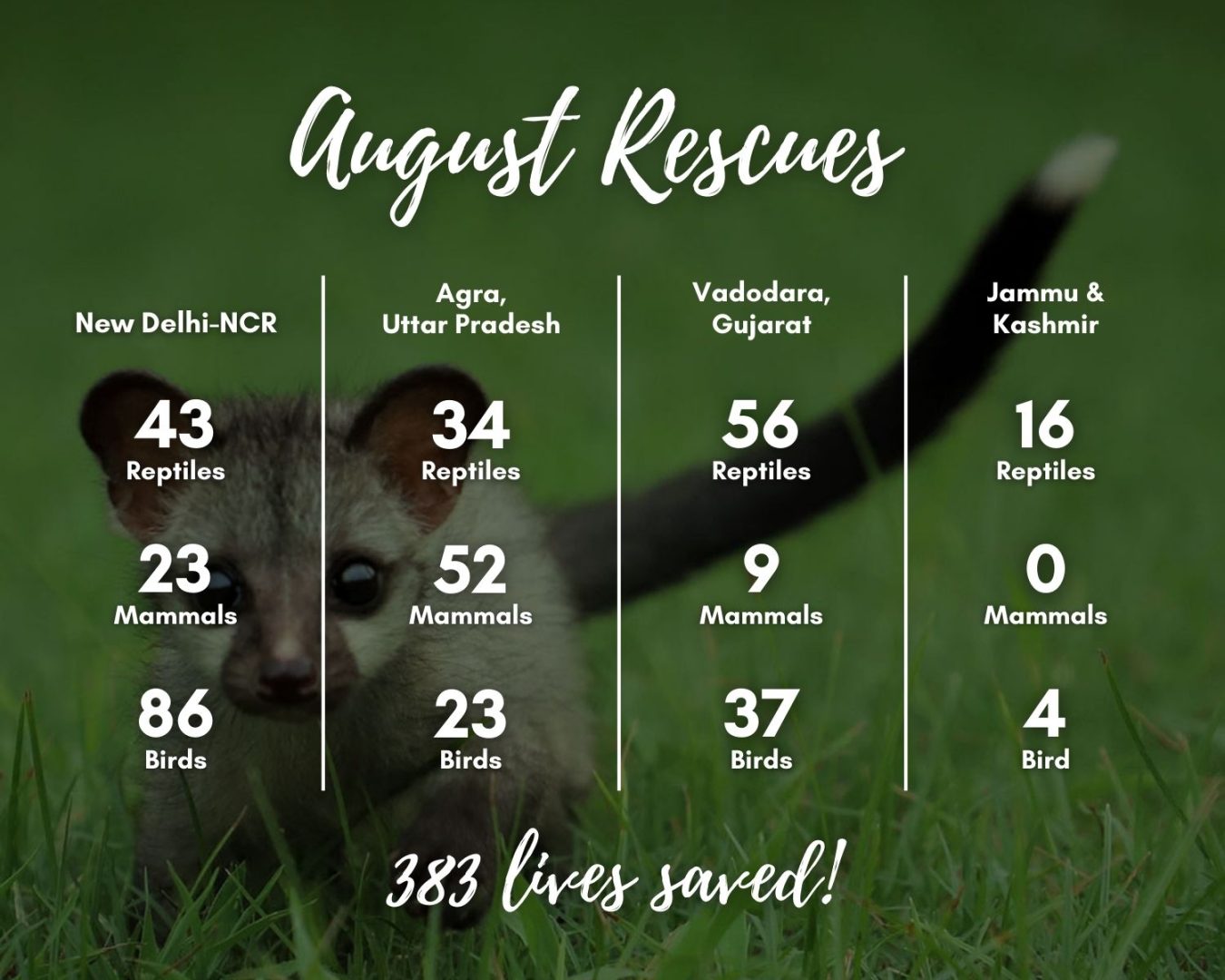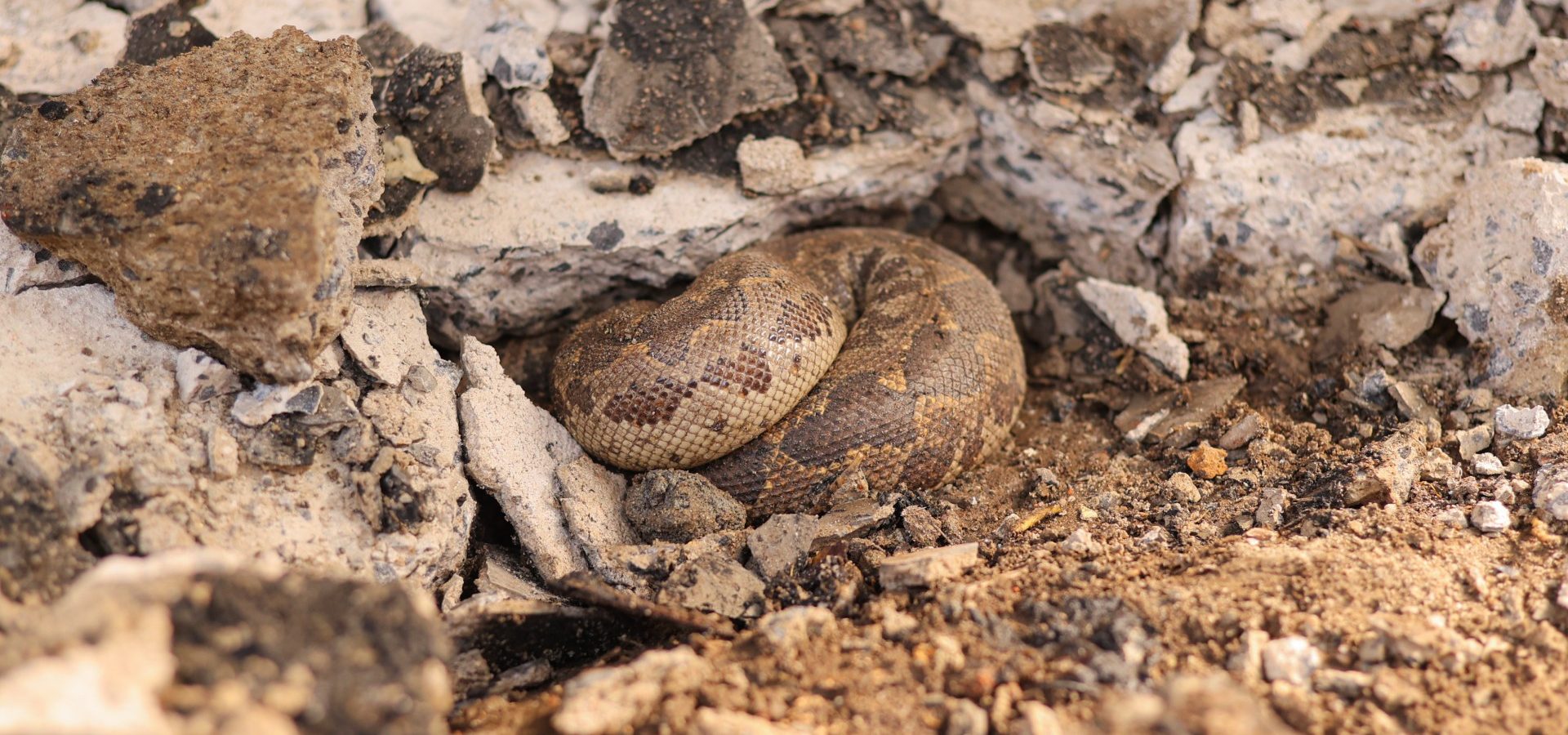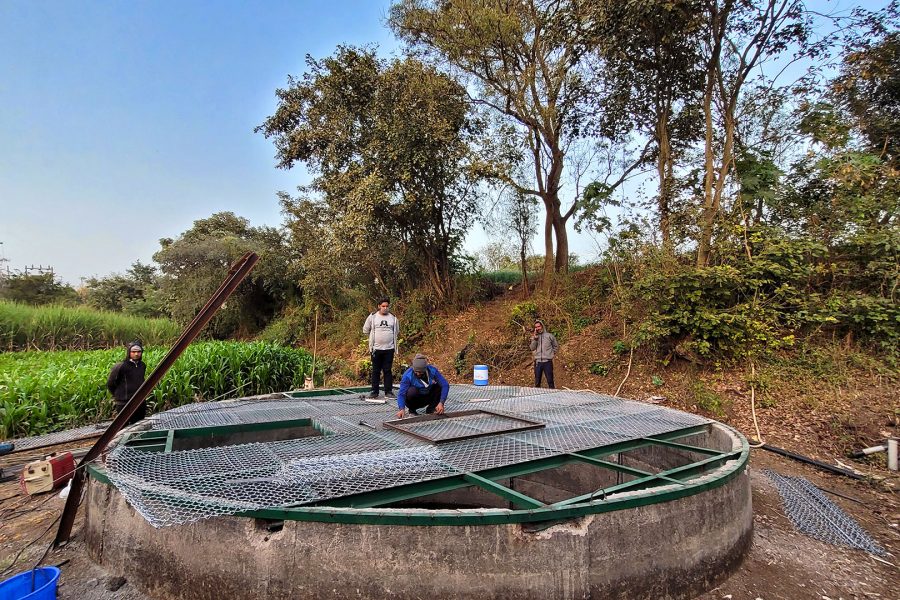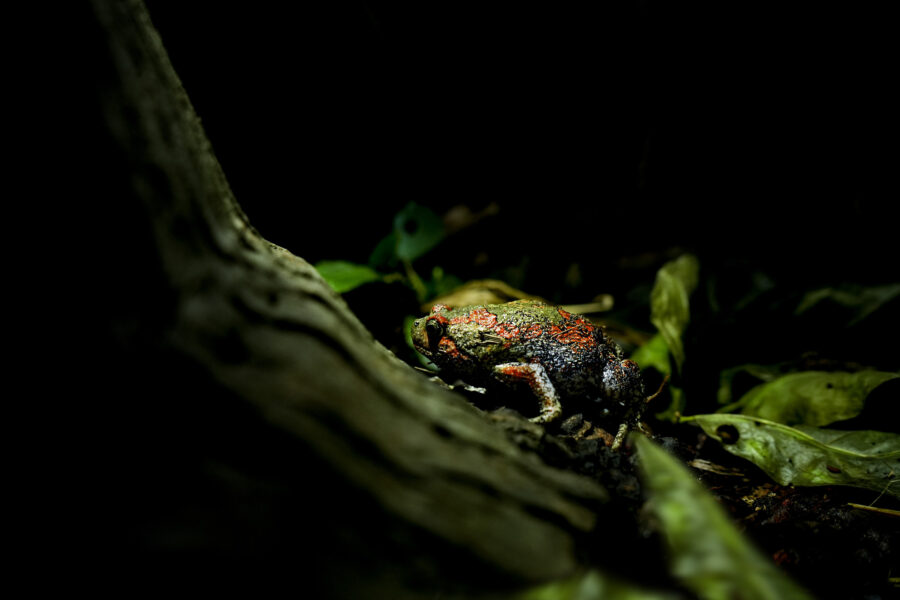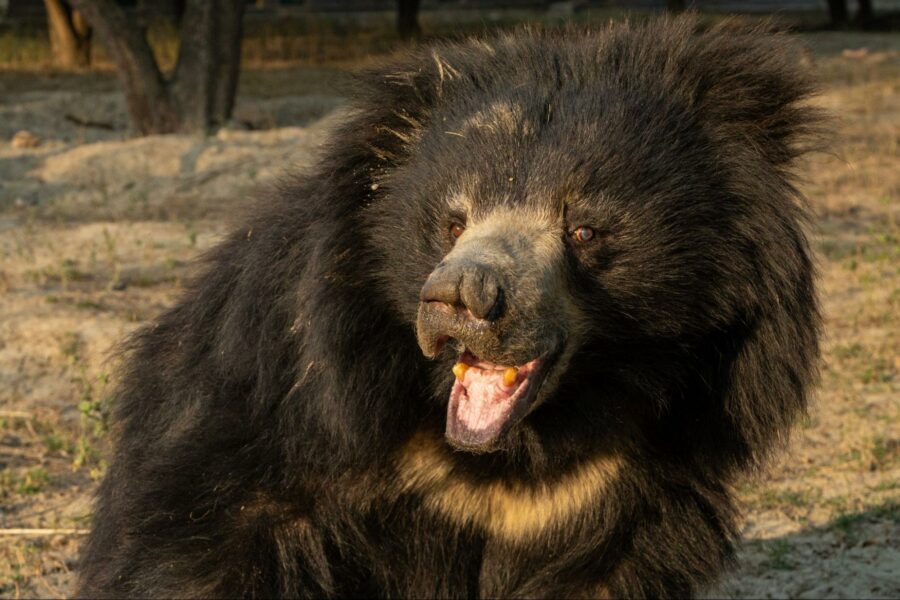When animals are stuck in distress, the Wildlife SOS Rapid Response Units are always ready to respond to their call of duty. The month of August kept our teams busy with several rescue operations, including that of a clutch of python hatchlings, crocodiles from people’s kitchen, and snakes from the high Himalayas. Here’s how the month of August 2024 transpired for the rescue team.
Delhi-NCR
The rescue team in Delhi-NCR had to tackle quite a few snake related calls. The first of them involved a common sand boa (Eryx conicus) rescue from Jawahar Park Devli Road in Khanpur. This was followed by the rescue of an Indian rock python (Python molurus) from IGNOU University, Maidan Garhi. The snake was spotted in broad daylight near a car, possibly out to get some external source of heat. The snake was safely relocated by the rescuers to a suitable natural habitat to avoid any anthropogenic disturbance.
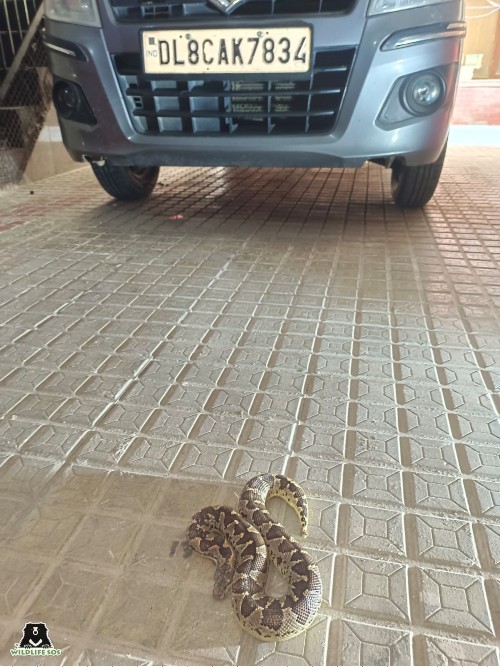
Imagine that you go about your day’s work at the office and as soon as you open your tiffin during lunch break, you spot a checkered keelback (Fowlea piscator) in the premises. That is what happened when an employee at the Bharat Heavy Electricals Limited (BHEL) office in Film City of Noida came across the snake and was startled by it. Our Rapid Response Unit received a call about the situation and rescuers swiftly reached the place to save the snake.
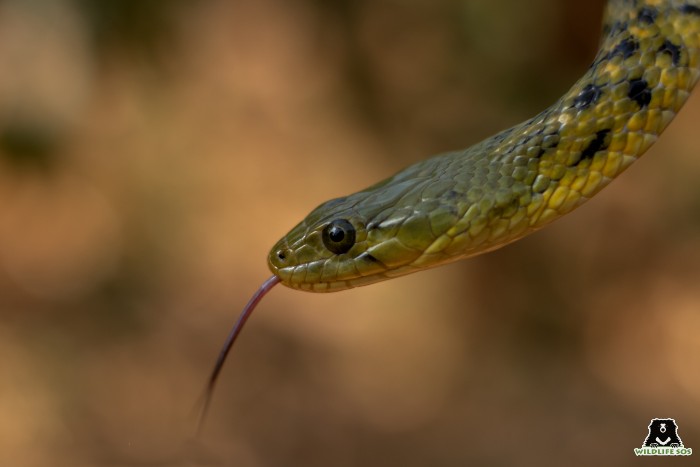
Urbanisation has heavily impacted natural environments, due to which wild animals are often found in busy thoroughfares of cities that were once wild spaces. A call concerning a black kite (Milvus migrans) found sitting still at the Punjabi Bagh metro station was addressed by the unit. After examining its health, the rescued bird was declared fit to be released.
The total rescue tally for Delhi stood at 152 in the month of August. A total of 86 birds were rescued including crows, pigeons, mynas, peacocks, parakeets, kites and doves. The team rescued 43 reptiles from in and around Delhi. The species included common sand boa, common wolf snake, checkered keelback, black-headed royal snake, Indian cobra, Indian rock python and Indian rat snake. The team also saved 23 mammals in the month that included bats, squirrels and rhesus macaques.
Agra, Uttar Pradesh
The biggest highlight for the Rapid Response Unit in Agra was a successful joint operation, wherein the Uttar Pradesh Forest Department and Wildlife SOS rescued a clutch of 25 newly hatched Indian rock python babies from an unused tubewell in Pali Gokulpura village in Etawah district. The operation was conducted in response to a local alert about the presence of the young reptiles.
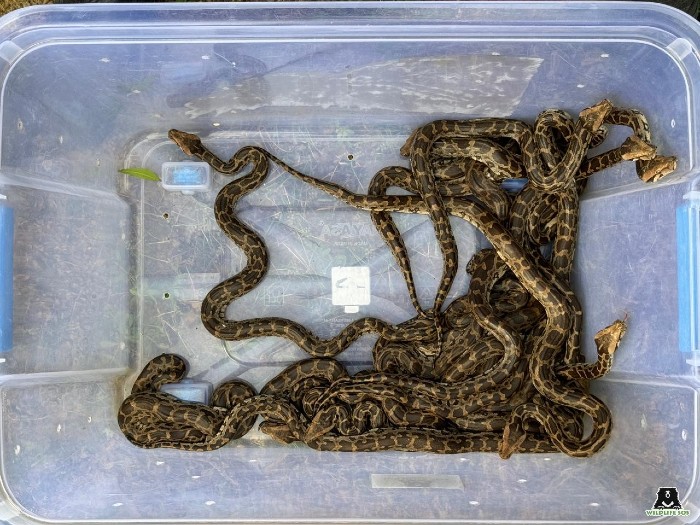
The Indian rock python, a native species to India, is protected under Indian law. Despite their protected status, these snakes face threats from human activities, including habitat disturbance, being poached as pets and accidental encounters. The rescue operation was crucial in ensuring the survival of these vulnerable hatchlings.
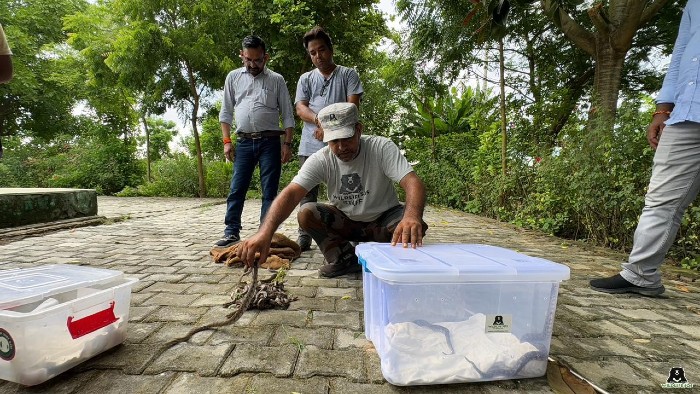
The rescued hatchlings were carefully assessed by Wildlife SOS’ veterinary team and found to be in good health. They were subsequently released into their natural habitat, for them to grow and thrive.
Agra’s rescue operations were marked by numerous reptile rescues due to the monsoon rain. The team rescued 34 reptiles in the month including Indian rat snake, Indian rock python, common wolf snake, spectacled cobra, red sand boa and mugger crocodile. The Rapid Response Unit saved 52 mammals with species such as spotted deers, rhesus macaques, nilgais and civets. Among the avians were Indian grey hornbill, Indian rock pigeon, Indian peafowl, barn owl, black kite, cattle egret, common myna and cockatiel, with the team rounding off the month with 23 bird rescues.
Vadodara, Gujarat
Heavy rains in Gujarat led to a significant rise in crocodile sightings across the state, prompting intensified rescue efforts by Wildlife SOS-Gujarat Society for Prevention of Cruelty to Animals (GSPCA) team in collaboration with the Gujarat Forest Department. The onset of the monsoon season created challenging conditions for reptiles, particularly for crocodiles, whose natural habitats were inundated. As a result, the crocodiles ventured into urban areas leading to increased rescue activities.
One such rescue involved a nearly 5-foot-long mugger crocodile that was found trapped in a net at a cricket academy field near Rajmahal Compound. The Wildlife SOS-GSPCA team, working alongside the Gujarat Forest Department, successfully freed the crocodile without any injuries and ensured its safe transfer to the forest department for further care.
In the early morning hours, a family residing in the Jalaram Nagar slum, Karili Bag in Vadodara, woke up to an unexpected guest in their kitchen — a 1.5-foot-long baby crocodile. The crocodile had silently entered the kitchen, causing no harm or injury to the sleeping family. The family discovered the reptile only after waking up and immediately alerted the Wildlife SOS emergency rescue helpline. The Wildlife SOS-GSPCA team then safely rescued the crocodile and handed it over to the Gujarat Forest Department for further care.
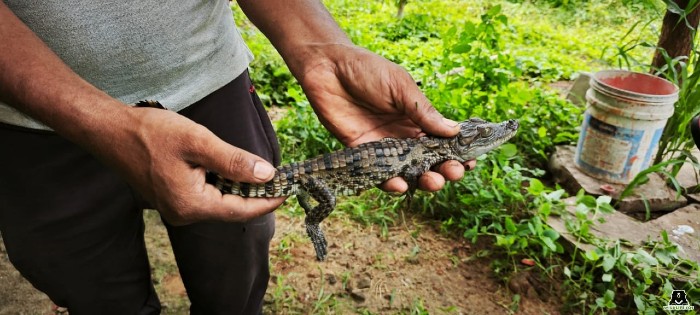
Vadodara saw quite a few reptile rescues in lizards, snakes, turtles and crocodiles. The Rapid Response Unit rescued 15 venomous and 29 non-venomous snakes, taking the tally to 56 reptiles in the month. With 37 birds and 9 mammals, the rescue team in Vadodara saved 102 lives in the month of August.
Jammu & Kashmir
The rescue tales in Jammu & Kashmir always come with unique flavours. The month started on an eventful note when a venomous Levantine viper was rescued from a famous tourist attraction site in Srinagar, named Mughal Garden. It was a night-time rescue and the reptilian resident was discovered in the Mughal Garden staff quarters. What made it challenging were the location’s busy thoroughfare and the time of the night to track down one of the most venomous snakes found in the country. The team finally spotted the snake tucked quietly on a wooden roof of the staff quarters.

The snake was safely extricated by the rescuer and was later discovered to be 3 feet in length. The snake rescues taking place during the month happened mostly from office spaces and residential gardens. One incident occurred in an office where a Himalayan trinket took refuge in a dry sump system. A rescue team member carefully extricated the 5-foot-long trinket and shifted it to safety.
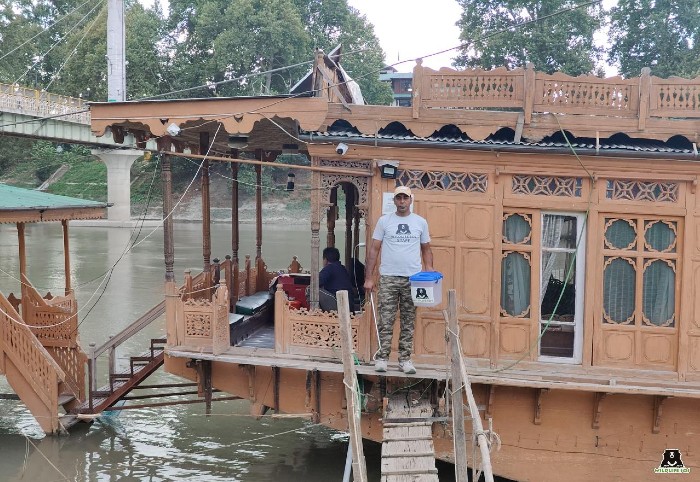
An interesting case involving the rescue of an Indian rat snake that sought refuge inside the cabin of a houseboat wrapped up the series of rescues taking place in Kashmir. There were increased instances of snakes being spotted, more frequently compared to summer months, since the higher temperatures are not encouraging for the reptiles to venture out. However, being familiar with the pattern, our rescuers were up for the challenge and carried out the rescues seamlessly.
In all, 20 rescues were carried out in August from Jammu & Kashmir that included black kites, falcons, Indian rat snakes, Himalayan trinkets, eastern cliff racers and Levantine vipers.
Every month, Wildlife SOS receives hundreds of calls regarding distressed animals trapped in urban areas. Wildlife SOS operates 24×7 emergency rescue helplines in four regions:
Delhi NCR – +91-9871963535
Agra & Mathura in Uttar Pradesh – +91-9917109666
Vadodara, Gujarat – +91-9825011117
Jammu & Kashmir – +91-7006692300, +91-9419778280
If you come across any wild animal in distress, do alert our rescue teams on these numbers as soon as possible.
